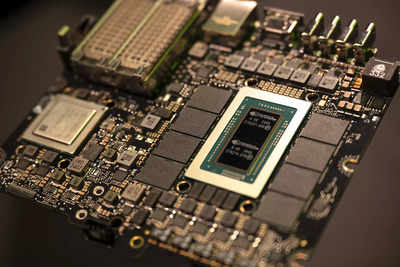
As the Trump administration escalates its efforts to restrict semiconductor exports to China, industry experts warn that the move could have unintended consequences, namely, accelerating China’s domestic chip innovation and eroding US dominance in the global semiconductor market, AFP reported.
The latest restrictions require US chipmakers like Nvidia and AMD to obtain licenses before exporting high-performance processors to China, over concerns they could be used in military or supercomputing applications.
But analysts say this pressure might push Chinese companies to become more self-reliant—and more competitive.
“What’s actually happening is that the US government right now is handing China a big win as it tries to get their own chip business going,” said Jack Gold, principal analyst at J Gold Associates.
“Once they’re competitive, they’ll start selling around the world and people will buy their chips.”
Financial fallout for US firmsIn regulatory filings this week, Nvidia said the licensing requirements could cost the company up to $5.5 billion (Rs 45,870 crore) in lost sales. AMD estimates a potential revenue hit of $800 million (Rs 6,672 crore) due to the export restrictions.
Nvidia had developed its H20 chip specifically for the Chinese market, carefully optimizing performance while staying within earlier US trade rules.
Now, those chips require government approval before being shipped.
AMD faces similar hurdles with its MI308 GPU line, designed for AI and gaming applications. The company stated there is "no guarantee" licenses will be granted.
Opening for Chinese tech giantsExperts believe the restrictions are creating a major opportunity for Chinese firms like Huawei to accelerate efforts to dominate the chip landscape.
“It’s going to be a godsend for China as they spin up their own microprocessor business,” said independent tech analyst Rob Enderle.
“This will be a really quick way to hand over US leadership in microprocessors and GPUs.”
China, which already invests heavily in its chip sector, is likely to increase spending and policy support to close the technology gap.
“The worldwide economy is not like that,” Gold said, pointing to Trump’s aggressive trade policies. “You can’t just bully people. These tariffs are alienating allies, and they might start turning to China for chips instead.”
Strategic concernsNvidia CEO Jensen Huang has tried to downplay the impact, saying the company will remain compliant while continuing to push technological boundaries. But some analysts see the situation as part of a larger geopolitical struggle.
“The Trump administration knows there is one chip and company fueling the AI revolution and it’s Nvidia,” said Wedbush analyst Dan Ives. “So it placed a ‘Do Not Enter’ sign in front of China.”
Ives warned that the conflict is far from over. “We expect more punches to be thrown by both sides,” he said.
As US firms brace for export losses, the race to build the next generation of semiconductors is entering a new, uncertain phase—one where China may gain speed rather than slow down.











 English (US) ·
English (US) ·